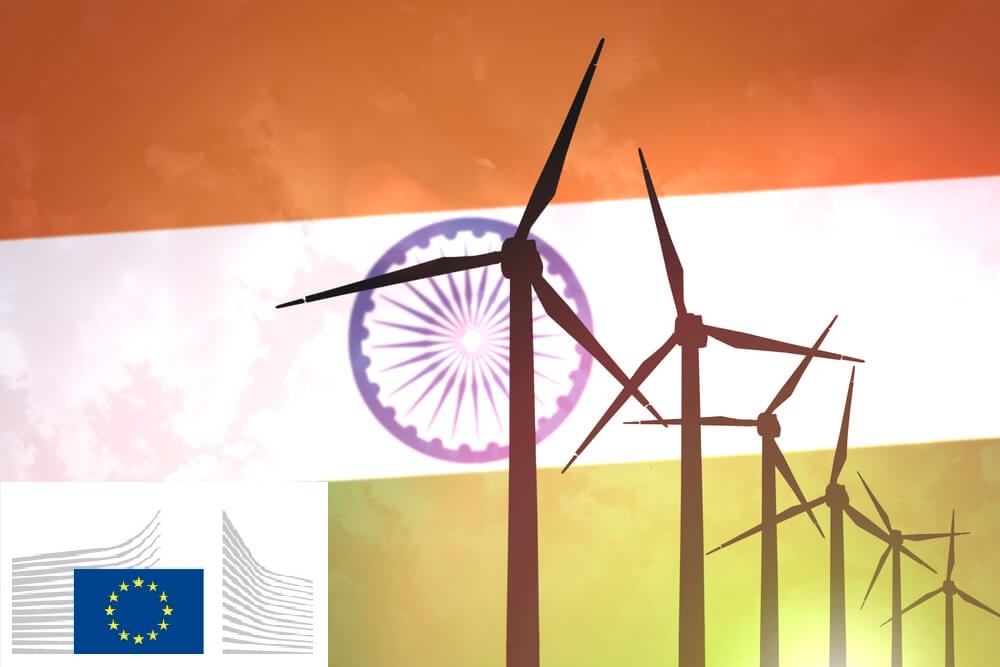EU-India Strategic Partnership, Focus on Sustainable Modernisation
The partnership will work to enable a transition to sustainable practices in India by bringing in green technologies.

The European Union (EU) recently announced in a joint communication that it aims to reinforce the EU-India strategic partnership, with the prime focus on building a strong partnership for sustainable modernization. Through the partnership, the EU expects to join forces with India to consolidate the rules-based global order, to develop a shared approach at the multilateral level to address global challenges and seek common responses to security threats and regional issues.
“India’s energy mix is currently dominated by coal (50% of primary energy consumption), but the country has started implementing one of the world’s largest clean energy transition programmes using its renewable energy potential. EU-India cooperation can help to deliver reliable, sustainable and affordable energy systems, while at the same time contributing to the growth of the EU’s energy technologies sector. The EU will further engage with India on energy security, energy efficiency, renewable energy sources, including solar and offshore wind, smart grids and off-grid systems, as well as on policies to develop an electricity system which can reliably integrate large shares of renewable energy,” says the EU statement.
The partnership via its clean energy and climate policy will work on bringing in business solutions and green technologies in order to enable the energy transition and address climate change by increasing resilience and reducing greenhouse gas emissions. Besides this, the EU will engage with India on energy security, efficiency, renewable energy sources, including solar and offshore wind, smart grids and off-grid systems, as well as on policies to develop an electricity system which can reliably integrate large shares of renewable energy.
Commending India’s strong stance against climate change and political will in negotiations for the Paris Agreement, the union aims to support the implementation of the Paris Agreement, seeking closer cooperation on climate change mitigation and adaptation and mutual learning to inform the development of the long-term strategies to be submitted under the Agreement. Similarly, EU has stated that cooperation is essential for developing an ambitious post 2020 global framework on biodiversity.
The following are the actions that the EU would focus on to take to achieve the mentioned goals:
- To continue the implementation of the EU-India clean energy and climate partnership, the EU will focus on regular exchanges, and use it as a platform to coordinate multilateral and bilateral approaches to climate change and energy security.
- Support India’s clean energy transition, through contribution to India’s flagship initiatives on offshore wind, solar power, smart grids, energy efficiency, energy access, and affordability.
- Support the development and implementation of climate and energy action at the local level, including in the framework of the Global Covenant of Mayors for Climate and Energy in India.
- Step-up coordination with India at multilateral level to strengthen global action on climate change, including the implementation of the Montreal Protocol, on the environment and clean energy, supported by enhanced cooperation in international fora on research and innovation.
- Support the implementation of the Paris Agreement, share knowledge on modeling and the development of low emissions scenarios to inform mid-century low greenhouse gas emission development strategies, as well as on climate change adaptation.
- Work together in addressing major environmental challenges, stepping up the implementation of existing biodiversity targets and developing an ambitious new global biodiversity framework for adoption in 2020, while maximising links with climate change policies.
Other areas that the EU will look to work on will include trade, digitisation, urbanisation, development of rural communities, data protection, public health and, research and innovation.
Thus, in effect, the EU seeks to ensure India’s efforts to meet its Paris agreement targets have a heavy EU involvement too, creating business opportunities for firms in the sector in the EU too. Considering the fact that for developing countries like India, one of the key challenges has been access to green technologies at a cost that is viable, we hope this initiative from the EU will focus on that aspect too, to make a real, significant impact on the fight against climate change.
Importantly, considering the sheer size of the work ahead, and by default, the opportunity in the area, India also needs to ensure this is not a one way street, and explore ways to ensure its firms get preferential or fair access to EU markets too, where they offer services that are relevant.




